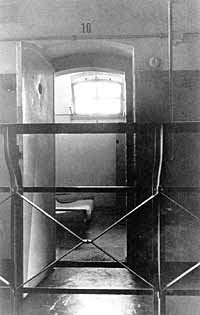When I am asked about the topic of my doctoral thesis, interested people ask me, why Dietrich Bonhoeffer? My doctoral thesis will not actually be about Bonhoeffer. At this stage I see him more as the concrete embodiment of a certain view of ethics, which comes from Kierkegaard’s idea of “the teleological suspension of the ethical.” But technical thesis details aside, I find Dietrich Bonhoeffer simply fascinating.
Bonhoeffer in the courtyard of Tegel prison (summer, 1944) Photo source: Christian Kaiser Verlag
I first read his “Letters and Papers from Prison” - a collection of letters written while he was imprisoned awaiting his trial – two years ago. It is a small Fontana paperback, and my copy is full of pencil marks, sticky notes and printed pictures of cultural icons - the Lacoön, Michelangelo’s Pieta, references to art, music, history, Greek philosophy and of course, theology. What struck me most at that time was the highly educated prisoner himself occupying a tiny, bleak cell at Tegel prison. The prisoner Bonhoeffer, who does not abandon his dignity, humanity or faith behind prison bars, but in a sense finds himself precisely there. He is a middle-class, classically educated German, a Protestant theologian, a church minister, a loyal friend, a loving son, a brother, a fiancée and quite frankly, one of the most human Christians I could chance to meet.
Bonhoeffer's Cell in Tegel Prison. Photo source: Christian Kaiser Verlag
I feel privileged and am very happy that my thesis gives me the perfect opportunity to develop a closer acquaintance with Dietrich. Our “relationship” is still in its early stages. I am reading some biographies, alongside his own writings. Most of Bonhoeffer’s writings were composed “in action”, or in direct response to personal, religious and political questions and problems that confronted him in his time and place. There was no ivory tower for Bonhoeffer, no time or place from which he might build an elaborate philosophical or theological system with which to impress future generations. I love that about him! For example, his book “Ethics” is a compilation of complete chapters, notes and preliminary sections – most of which were concealed in garden hiding-places and written over three years, in quiet moments carved out between increasingly urgent church and political activities.
Whenever I become tempted by the ivory tower, or frustrated with institutional bureaucracy, or I wilt in the aridity of academia, I return to the flesh and blood Dietrich Bonhoeffer. And whenever I become bogged down in Bonhoeffer’s own specialised theological works, I remind myself of the concrete reality of his life – the choices and the commitments he made.
One of the recent biographies I have read is Renate Wind’s “A Spoke in the Wheel”. This is an excellent introduction to Bonhoeffer, it is well-written and conversational. Renate brings Dietrich Bonhoeffer to life- the person, the theologian and the political activist –though I think political activist seems such a facile word to use in connection with someone who fought the Nazi regime until they hung him with piano wire from meat-hooks two months before the end of the war.
Throughout Renate’s introduction to Bonhoeffer, I really got the sense of a person who lived his life torn in two directions. Renate describes Dietrich as someone who was torn personally – between self-confidence and self-doubt. But it seems to me he also found himself at sea, torn between the traditional values of the German middle-class citizen and the “new” values of the next generation - Nazi Germany.
Throughout Renate’s introduction to Bonhoeffer, I really got the sense of a person who lived his life torn in two directions. Renate describes Dietrich as someone who was torn personally – between self-confidence and self-doubt. But it seems to me he also found himself at sea, torn between the traditional values of the German middle-class citizen and the “new” values of the next generation - Nazi Germany.
I aim to write something of Dietrich’s life and person in the next few posts. I will follow this theme of conflict within, and of being torn in the face of a changing world. I might call it "Dietrich Bonhoeffer - A man divided". I will introduce Dietrich in this way for two reasons. I think the theme of the person divided, torn within himself or between competing loyalties or affections is interesting and also relates to my thesis. But there is also my own personal and existential experience as being torn within – there are countless ways we find ourselves conflicted. I have not made up my mind whether I will also write about some of these conflicts. But I don’t think I can avoid my personal interest in Dietrich Bonhoeffer, and I don’t think I want to avoid it. There is something about Dietrich (and I have just found the title for this post) that strips away the conventional façade, or social norms behind which we hide for security and self-protection. You cannot have a conversation with Dietrich, you cannot read his work or see his life, without examining yourself in new ways. And this is not a bad thing. It may even be a good thing, a very good thing. The one decree that drives the philosopher, as Socrates well knew, is “know thyself”. All good philosophy must surely begin with some self-examination. Let the academics in ivory tower hide behind their intellectual mask – we shall bravely venture forth with Dietrich!
And with that noble and inspiring call to action…I will finish this post.


